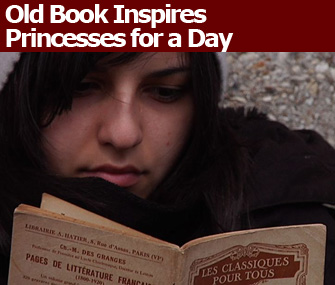
The other day I walked into one of the many chic gift shops in the Marais district of Paris and found myself drawn to a pack of old books, only to discover that they had been tied together so tightly that they were clearly intended never to be read and were on sale solely as a fashion statement for the home. Although I know that books have long served as a decorative feature in people’s homes, at least they used to offer the illusion that their owners intended to read them at some point! Is France, that great defender of the intellectual, at a crisis point? After all, the country’s current president famously sneered that Madame de La Fayette’s 1678 novel La Princesse de Clèves was not worth studying.
Régis Sauder’s new documentary, Nous, Princesses de Clèves, is a direct response to Nicolas Sarkozy’s derision, as the film follows the pupils of a high school in one of the most deprived neighborhoods of Marseilles as they act out scenes from and respond to the novel by drawing parallels with their own lives. Sauder is cashing in on the success of movies from recent years, such as Etre et Avoir and Entre les Murs (The Class), which vividly show the teaching process at work, and L’Esquive (Games of Love and Chance), which featured teenagers from deprived areas acting scenes from a play by the dramatist Marivaux. As in the documentary Etre et Avoir, the students’ parents are interviewed, and one of the students even bears an astonishing resemblance to one of the lead actresses in Entre les Murs.
Yet, as engaging as parts of this film may be, Nous, Princesses de Clèves does not have the narrative drive or charm of the previous movies. Even though some of the comparisons to the 17th-century text reveal interesting insights – not least the interpretation of the princess’s mother, Mme de Chartres, by some of the pupils being brought up in strict Muslim households – we never get to see enough of the pupils’ lives to make us really care about them. Some of the female students speak vaguely about their own relationships, but the director does not follow up by interviewing their boyfriends. Another missed opportunity: one of the teachers seems to have real charisma and intelligence, but she only appears very briefly at the beginning and during a school trip to Paris, when they visit the Bibliothèque Nationale and are shown copies of the first editions of the novel by Jean-Marc Châtelain, one of the library’s curators.
A good knowledge of La Princesse de Clèves is probably needed to appreciate this film; I have taught the text for years and enjoyed the acted extracts from the novel, but my companion, who had not read the book, found them dull. (The students, by the way, are surprisingly fine actors).
All in all, this movie is a worthy but flawed attempt to prove to Sarkozy that reading old books can still be relevant today. In the meantime, I urge you not to buy packs of books being sold purely as designer chic in the Marais unless you intend to read them!
